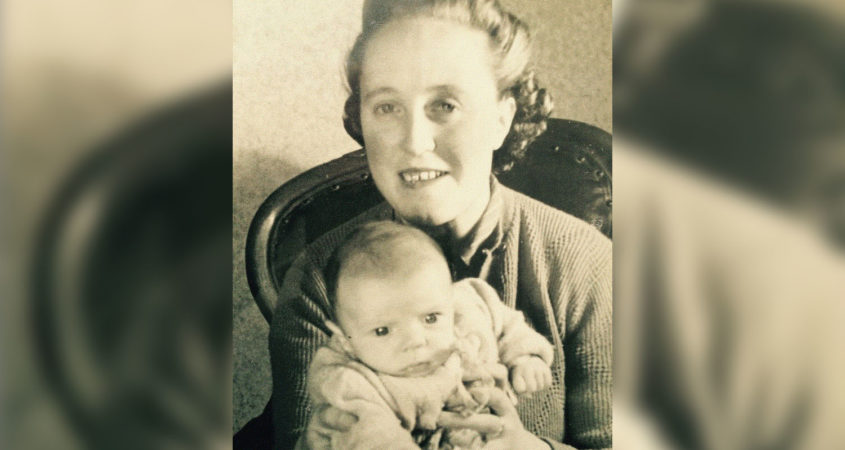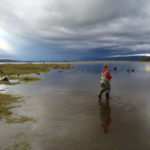Ella Wooley
On a stormy night, on the other side of the earth, in an entirely different time, Eliza Wilson Small, blond and piercingly blue-eyed from her distant Viking ancestors, was blown into the world. It was the second of March 1917 and early spring in the ancient, grey stone, Scottish town of Paisley. As far as I can tell, her arrival was of little importance in the greater process of history, but of vital importance to me. Ella Wooley (nee Small) is my mum and amazingly, she is still around, at the age of ninety-eight.
“Och!” She declares in an accent that belies the seventy years she has spent out of Scotland, “These days I wake up in the morning and I say, ‘Oh God. I’m still here!’
But it’s not like that. No one makes it to such a prodigious age without having an almost unseemly, greed for life. Despite her protestations, clearly the old girl is not yet ready to go. If you’ve got a fierce old mum, like mine, then I’m not telling you anything you don’t already know.
I’m taking her for a ride in my wife’s small convertible. It’s the only car we have that she can infirmly clamber into without too much grumbling. It’s a nice day so I put the roof down. The machinery whirrs, but doesn’t drown out my mother’s complaints. “What are you doing? The sun’s too strong. I’ll get skin cancer!”
“Pretty long term concern for a woman who doesn’t want to live another day” I observe archly, but she’s probably not listening. The ancient, protest too much, I remind myself. They don’t rack up all those years without trying, even though they know from cruel experience, the unpleasant realities of living too long. I remember my mum as a robust woman who climbed mountains and could walk thirty kilometers a day without effort. Now she’s a grumpy old dear, tottering along to lunch in a walking frame. But if the flesh is weak the spirit is still strong.
“And don’t drive so fast. I don’t want to end up in hospital again. There was no bed and I had to sleep in the corridor. I would’ve died if they hadn’t discharged me back to the nursing home. And will you wind up the car window! The draft is freezing cold and I’m getting a stiff neck.”
“If you don’t die soon, you are going to outlive me and then where will you be?” I mutter, but she doesn’t hear.
Now you’re probably wondering if I’m in trouble for writing this. I might well be, because my mother still has all her marbles. She’s an avid reader and she has a great memory, as sharp for the detail of yesterday as for eighty years ago. But there is one marble that has rolled away, somewhere. The one that tells her that she’s already told me many times, that perfectly recalled story.
“I wouldn’t have chosen to live to this age, but I realize that I have been very lucky. I’ve kept my wits, more or less. I live in a lovely caring place with a view of the beautiful Huon River, and I can still enjoy a good meal and a conversation.”
When Ella was born, the armies of the Great War were, bogged down in the mud of France. The death toll was approaching sixteen million with twenty million wounded, and no end in sight. Yet that was a mere curtain-raiser to the dark history of Ella’s century-to-come, in which an estimated seventy-seven million people would die in wars. As well, there were huge numbers who perished from famine and the spread of epidemics, such as the Spanish Flu, which killed another fifty million people in peacetime.
My mum is indeed a survivor. In the Second World War she fought Hitler and won. As a Corporal, armed with only a bucket of water and a foot-pump, she was stationed at night on the rooftops of blazing wartime Edinburgh. Her orders were to extinguish the Luftwaffe’s incendiary bombs. It was a heroic but a futile action.
“It might be old-age speaking, but I think what I’ve seen over the years has made me pessimistic. When I was a young girl, I was growing up in a world of damaged men. I remember wheelchairs everywhere and men with missing limbs, young men horribly disfigured. It was such a common sight at the time, the horror of what had happened to a whole generation didn’t strike me until I was older.
“Then, in my war, the second one, we learned about the atrocities of the Nazi death camps. It was beyond all belief.
“Today, it gets no better. I watch the news from the Middle East and I just feel sad. We are now trying to fight awful people, who are just beyond reason. How can any good come of that?”
Ella’s not just part of the European story, she is also part of the story that created our nation. Mum’s generation built modern, post-war Australia. As part of that mass migration of millions of people from the other side of the world, she came with my dad, Charlie, to work on the power schemes at Tarraleah on Tasmania’s, back then, remote Central Plateau. I grew up, a Hydro-kid, in a wild place, wearing (Ella remembers and I don’t) company-issued jodhpurs, even on the hottest days, as a protection from snakebite.
Charlie, her husband of almost seventy years, died a few years ago at the age of ninety-two. But wife, it seems, goes on forever. She will turn 100 in March next year.
So after two world wars and a depression, a long marriage and from the vantage point of great age and experience, how much influence does she think the ordinary person has over, if not the world, at least their own life. “Surely we have some any say in it?” I ask.
I didn’t find her answer very reassuring.
“Well” she said, “I don’t think we really are the captains of our own destiny, as much as we would like to think. It seems to me that we are blown along by events. I’ve lived through a century of huge and terrible calamities, two world wars and an awful depression that people now couldn’t even imagine. I’ve lived through amazing changes and upheavals and somehow I’ve washed up in a nice place on the banks of the Huon River on an island at the end of the world. But I think I’ve just been lucky.”
She is living her last years in Huon Eldercare at Franklin, and I tell the staff there, that if Ella makes it to one hundred years, despite her apparent readiness to check out now, I shall hold them entirely responsible.
Neither of us is religious, so when it comes to the impending finality of it all, I can only joke with my mother about death. She insists, she really is ready to go, anytime now, “But I wake up and I’m still here.” And I tease her that she will only go kicking and screaming, and besides, she should realize that I am now far too old to have a mother to worry about.
“Son, you will miss your mother, when she’s gone,” she always chides, in the third person, as if that grammatical distance makes her point seem less like emotional blackmail and more a matter of accurate fact. “You will miss her more than you realize.”
She’s right of course. I will.
…………………..



